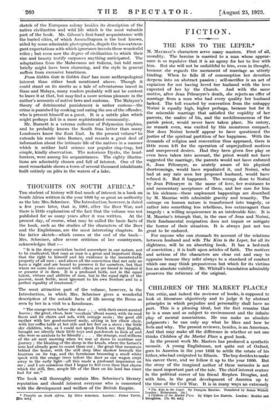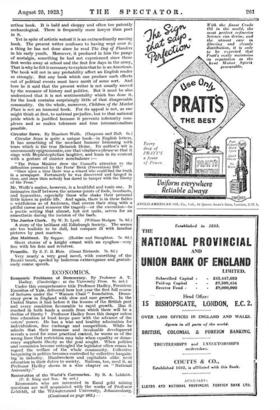CHILDREN OF THE MARKET PLACE.t THE critic, and indeed the
reviewer of books, is supposed to look at literature objectively and to judge it by abstract principles in which prejudice and personality shall have no part. This is a pleasing ideal, but the fact remains that he is a man and so subject tO environment and the infinite play of mental associations. He can make no absolute judgments : he can only say what he likes and how he feels and why. The present reviewer, besides, is an American. And that may make all the difference in whether or not one thinks Children of the Market Place a good book.
In the present work Mr. Masters has produced a synthetic memoir. ' A young Englishman, not• quite out of Oxford, goes to America in the year 1833 to settle the estate of his father, who had emigrated to Illinois. The boy decides to make his career there, and we follow it up to the year 1900. But the story of the imagined author of these memoirs is not the most important part of the tale. The chief interest centret in the political career of his friend Stephen Douglas, and; with him, in the great development of America up te the time of the Civil War. It is in many ways an extremels • The Kiss to the Lepei. By Francois Mauriae. Translated by James Whitall. London: Heinemann. Ms.] t Children of the Market Place. By Edgar Lee Wasters. London: Hodder and Stoughton. (7s. 6d. net.) . artless book. It is bald and choppy and often too patently archaeological. There is frequently more lawyer than poet in it.
Yet in spite of artistic naivete it is an extraordinarily moving book. The present writer confesses to having wept over it, a thing he has not done since he read The Dog of Flanders in his early youth. Moreover, it produced in him the pangs of nostalgia, something he had not experienced since those first weeks away at school and the first few days in the army. That is why he felt it necessary to explain that he is an American. The book will not in any probability affect an English reader so strongly. But any book which can produce such effects out of political events must have merit of some sort. And here be it said that the present writer is not usually moved by the romance of history and polities. But it must be also understood that it is not sentimentality which has done it, for the book contains surprisingly little of that disagreeable commodity. On the whole, moreover, Children of the Market Place is not an immoral book. For its appeal is not, as one might think at first, to national prejudice, but to that national pride which is justified because it prevents inferiority com- plexes and so makes tolerance and true internationalism possible.



































 Previous page
Previous page